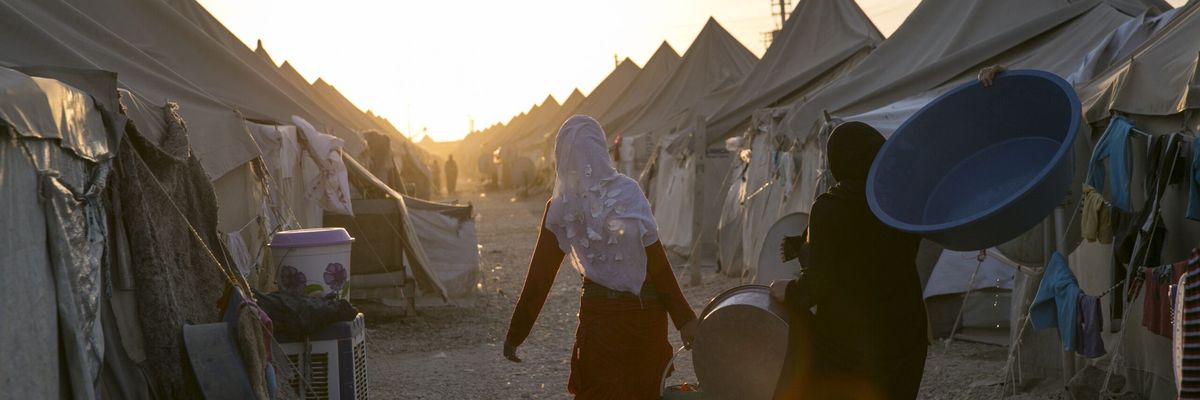Since the end of World War II democracy building has been a bedrock of American diplomacy. I’ve spent the better part of my career partnering with nonprofits, future elected leaders, and everyday citizens to build and strengthen democracy here at home.
My fundamental belief has rested on the idea that helping to impart stable governance leads to stronger communities and states. This also reflects a long-held American view that the world is safer, happier, and more prosperous when countries derive their powers from the consent of the governed and, however imperfectly, uphold individual rights and human dignity. That has certainly been on the forefront of my mind since the Russian invasion of Ukraine.
But after completing a recent, month-long German Marshall Fund Marshall Memorial Fellowship across several European nations, I discovered that reality is significantly more complex, and certainly more nuanced, especially during wartime.
In Brussels, I met with leaders from NATO and the European Union, and while the overwhelming theme was unity, the next four countries I visited had their own interpretations of the current war in Ukraine. One thing became clear — not all democracies are monolithic, and today’s Europeans are rightly proud heirs to free societies built from the ashes of fallen tyrannies.
Visiting the Netherlands, Czech Republic, and Germany allowed me to understand how members of the EU view this conflict —they want it resolved quickly, with swift action taken against Russia and Putin. However, in Turkey, officials I met with (from the Ministry of Foreign Affairs and members of parliament) had a different perspective. They viewed the war from a geopolitical position rather than one united with NATO and clearly different from EU member states. They are the only NATO member country that has not issued sanctions against Russia, and while officials say they believe in the “territorial integrity” of Ukraine, Turkey’s more neutral stance has put it in a better position to play mediator in any future negotiations, and in fact hosted talks in the early part of the conflict.
Meanwhile, Ukraine’s military has used Turkish drones in their fight against Russia. Until recently, Turkey kept its skies open to Russia after 38 countries banned Russian airlines from their airspace, but in late April, Turkish Foreign Minister Mevlut Cavusoglu reversed course.
Still, other nations are less apt to see the conflict play out through a lens of negotiation and have moved to sanction Russia for its aggression. In early April, the United Nations General Assembly overwhelmingly voted to adopt a resolution to suspend Russia from the Human Rights Council. After the vote, Russia stated it was quitting the council. The EU, UK, U.S. and Canada have opted to put the most stringent economic sanctions on Russia, though so far the EU has opted out of cutting off energy imports from Moscow.
As expected, China, Iran and Syria were among those who voted against the UN resolution and sanctions, with Brazil, Indonesia, Mexico, South Africa, Pakistan and Jordan among those who abstained on the condemnation. Many of the African nations see the conflict as a proxy war between the U.S. and Russia, and are resistant to cutting off trade with Moscow. For example, wheat and fertilizer are major Russian imports, with nearly a third of the continent reliant on that trade. As many African countries are beginning to gain their independence economically, they are loathe to allow a new U.S. Cold War to usher in a new era of conflict.
Strategic Dependence
Meanwhile, India abstained from the UN General assembly vote, though Indian Prime Minister Narendra Modi called for “an immediate cessation of violence” right after the invasion began. Other south Indian countries abstained from voting to remove Russia, while three central Asian countries voted no. The Central Asian countries of Kazakhstan, Kyrgyzstan, and Uzbekistan all voted against the UN resolution. But there is a growing solidarity among key nations who voted either against or abstained from Russia’s removal of the UN Security Council.
Ultimately, countries voted in the interest of their respective democratic independence, or dependence on their alignment with Russia versus the west. Many can harken back to times when they assumed aligning with the West would provide them future security from conflict, but they were left to build or rebuild democracy alone.
When historical nuance meets today's war it is understandable that nations have different interpretations about safeguarding democracy. My travels allowed me to shift my perspective. In this view, American exceptionalism is a myth and our foreign policy has often driven violence, rather than eradicating it. Expecting international leaders to follow our lead without accounting for our past failures would be blind policy.
If history and this trip has taught me anything it is that our allies and friends have longer memories than the immediate threat they may face today. Democracy building is not just a game of offense and sometimes the best defense is little to no action until the timing is right and members of your team are strong enough to promote their own interests and build their own destinies.














